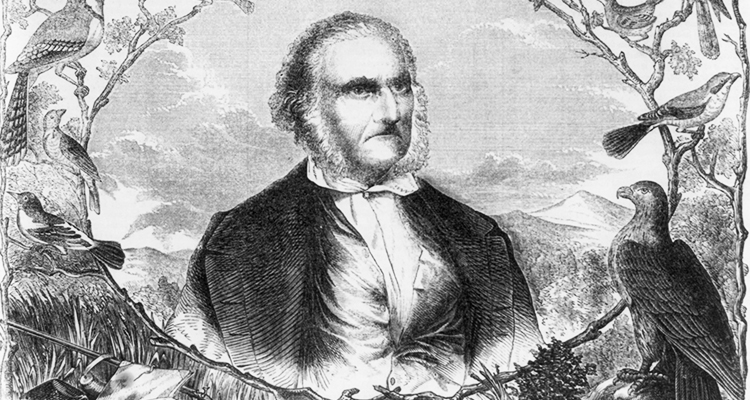During his trip to the Gulf of St. Lawrence in 1833, John James Audubon witnessed the destruction of thousands of birds and their nesting sites. Although Audubon himself routinely killed birds for specimens, he was appalled by the activities of the “egg-collectors of Labrador.” In his book Ornithological Biographies, he describes a “war of extermination,” in which the collectors not only destroyed nests, but killed birds for feathers and eiderdown as well.
The distinctive appellation of Eggers is given to certain persons who follow, principally or exclusively, the avocation of procuring the eggs of wild birds, with the view of disposing of them at some distant port. Their great object is to plunder every nest, whenever they can find it, no matter where, or at whatever risk. They are the pest of the feathered tribes, and their brutal propensity to destroy the poor creatures after they have robbed them, is abundantly gratified whenever an opportunity presents itself….
At the approach of the vile thieves, clouds of birds rise from the rock and fill the air around, wheeling and screaming over their enemies. Yet thousands remain in an erect posture, each covering its single egg, the hope of both parents. The reports of several muskets loaded with heavy shot are now heard while several dead and wounded birds fall heavily on the rock or into the water. Instantly all the sitting birds rise and fly off affrighted to their companions above, and hover in dismay over their assassins who walk forward exulting, and with their shouts mingling oaths and execrations. Look at them! See how they crush the chick within its shell, how they trample on every egg in their way with their huge and clumsy boots. Onward they go, and they when they leave the isle, not an egg that they can find is left entire. The dead birds they collect and carry to their boat. Now they have regained their filthy shallop; they strop the birds by a single jerk of their feathery apparel, while the flesh is yet warm, and throw them on some coals, where in a short time they are broiled….
For a week each night is passed in drunkenness and brawls, until, having reached the last breeding place on the coast, they return, touch at every isle in succession, shoot as many birds as they need, collect the fresh eggs, and lay in a cargo. At every step each ruffian picks up an egg so beautiful that any man with a feeling heart would pause to consider the motive which would induce him to carry it off. But nothing of this sort occurs to the Egger, who gathers and gathers, until he has swept the rock bare. The dollars alone chink in his sordid mind, and he assiduously plies the trade which no man would ply who had the talents and industry to procure subsistence by honourable means….
These people gather all the eider-down they can find; yet so inconsiderate are they, that they kill every bird that comes in their way. The eggs of Gulls, Guillemots, and Ducks are searched for with care; and the Puffins and some other birds they massacre in vast numbers for the sake of their feathers. So constant and persevering are their depredations, that these species, which, according to the accounts of the few settlers I saw in the country, were exceedingly abundant twenty years ago, have abandoned their ancient breeding places, and removed much farther north in search of peaceful security. Scarcely, in fact could I procure a young Guillemot before the Eggers had left the coast, nor was it until late in July that I succeeded, after the birds had laid three or four eggs each, instead of one, and when nature having been exhausted, and the season nearly spent, thousands of these birds left the country without having accomplished the purpose for which they had visited it. This war of extermination cannot last many years more. The Eggers themselves will be the first to repent the entire disappearance of the myriads of birds that made the coast of Labrador their summer residence, and unless they follow the persecuted tribes to the northward, they must renounce their trade.





